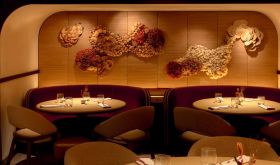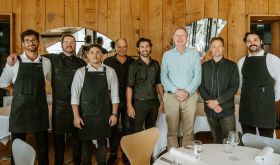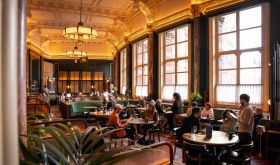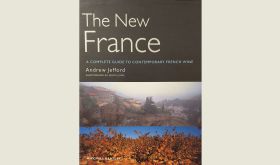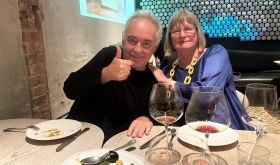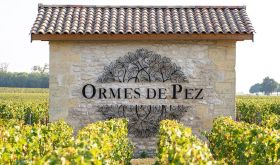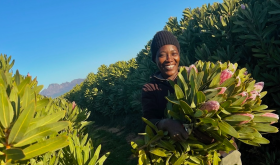For those fortunate enough to keep a watching eye on the ever changing progression of chefs worldwide there is considerable consensus that the three most culinarily exciting countries at the moment are Australia, Spain and the USA (although I wholeheartedly campaign for British chefs and not, I can assure you, on nationalistic grounds).
And whilst the inclusion of Spain obviously brings a surge of pride to most Spaniards it does not have the same effect on Madrileños, citizens of Madrid, who recognise that over the past decade their more conservative approach to food, wine and service has seen them left behind by the chefs and restaurateurs of the Basque region, Catalonia and, most recently, Valencia.
For a country where the political power of Castille has been so evident for so long, this situation was unlikely to continue and Madrid's culinary and vinous powers that be recently got together to put on their first-ever three-day 'International Summit of Gastronomy'.
My excitement at sitting amidst 400 mainly young Spanish chefs watching and listening to Chicago's Charlie Trotter, Sydney's Tetsuya Wakuda and the extraordinary French chemist Hervé This philosophise and demonstrate alongside several of Spain's finest chefs – most notably Juan Mari Arzak, Alfonso Iaccarino and the indefatigable Ferran Adria from El Bulli – was tempered by two conversations even before the plane had taken off from London about how disappointing eating out in Madrid can be. This was certainly the opinion of my companion on the Heathrow Express, an IT expert, born in Belfast and now resident in Hobokken, New Jersey, who frequently visits the Spanish capital, and that of the female energy executive sitting next to me on the plane who has lived in Madrid for the past six years.
The simple explanation, put to me by another keen observer of the Spanish culinary scene, is that in many instances Spanish chefs have moved from where they were a decade ago, when they were producing good-quality regional cooking, to where they are today – often producing breathtaking culinary excitement – without a groundswell that has affected the whole country. The regions have led the way leaving Madrid trailing behind.
But in a parallel to today's stock market, matters may seem bleakest just before a new dawn. Certainly, Sergi Arola, who worked at El Bulli for some time, is injecting considerable excitement into the kitchens at La Broche, part of the extremely comfortable Hotel Miguel Angel, where his wife runs the dining room with considerable poise. But whilst this all-white hotel restaurant leaves many behind in terms of design and acoustics, I left there feeling that what I had eaten had been a triumph of execution rather than a meal of well conceived flavours and textures.
This is all the stranger considering that three Frenchmen have proved with the resounding success of Café Óliver over the past year that young Madrileños are as receptive to and appreciative of good food and wine served in a friendly atmosphere as their counterparts around the world.
Antoine Melon and Karim Chauvin first met as students in the food and wine obsessed city of Lyon before going their separate ways in the restaurant trade. Whilst Melon was opening various outposts of the Conran restaurant empire in London, Paris and Stockholm, Chauvin had the enviable task of selling Dom Ruinart champagne and other top French wines to the most illustrious Spanish restaurants during the boom times of the late 1990s. (He laughed when I asked whether he had been paid for such hardship.) This experience led them to realise that what Madrid needed was, quite simply, a bistro.
Luck then played its part, firstly, when Café Óliver, an attractive corner site in the Almirante district now favoured by many young, up-and-coming designers, became available and then when the talented chef Frédéric Fetiveau decided Madrid was not for him as the French restaurant he had been sent over to open failed to prosper. Melon and Chauvin persuaded him to stay and their partnership became a triumvirate.
Café Óliver's menu incorporates the dishes of four different countries – Spain, Morocco, Italy and France – and it is this diversity which, Melon believes, has been the cornerstone of their success. 'People here refuse to admit that any one particular country's cooking is better than their own. But because we can offer traditional Spanish dishes such as Iberico ham, ropa vieja (veal stew) and hake alongside polenta with ceps and Moroccan kofte we have managed to overcome this.'
A reluctance to make service more efficient and user-friendly was perhaps an even bigger obstacle to establishing the relaxed restaurant Melon aspires to. 'I wrote a service bible for here as I had done in all the other restaurants I have opened but it initially met with astonishment because, I subsequently realised, it had rarely been seen before. Waiting staff tend not to be incentivised and stay in the same positions for far too long.'
Without losing its Spanish identity, obvious particularly in Chauvin's wine list which includes some of the country's most exciting new wines, Café Óliver's menu covers southern Europe and north Africa most effectively. A thick slice of rabbit terrine revealed a chunk of black truffle running through it; five Moroccan meze were fresh and authentic, whilst a tagine of oxtail with couscous and chickpeas and a slow cooked veal stew served in a copper pan combined hearty portions with aesthetic delivery. And all of it at very fair prices.
Encouraged by this success, Melon and Karim are working towards opening La Medina in a couple of months, a more Moroccan restaurant but one with an equally contemporary and relaxed feel. These, and those now run by fellow restaurateur, Miguel Angel Garcia (Café Saigón, Il Gusto, Tseyang and Le Dragon) are beginning to reveal Madrid's emergence into the 21st century.
Back in the conference hall the audience listened open mouthed to Adria's talk on how his sauces have evolved over the past decade and how he sees Chinese cookery as his next source of inspiration. And no one was left in any doubt about his achievements. Adria was introduced as the man who has done the most to spread Spanish culture over the past decade and he later revealed to me that during the first 48 hours in which El Bulli had opened their bookings line in mid-January for their summer 2003 season they had received no fewer than 7000 requests for bookings. Madrid's chefs and restaurateurs will have to work hard to catch up.


